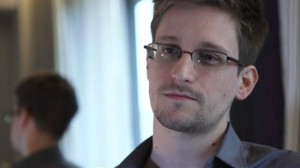As the old media propaganda battle inevitably heats up around the Edward Snowden case, I stumbled across this little American news gem recently. The premise being that potential whistleblowers are now deemed to be the new “insider threat”.
Well, the US spooks and their friends have already had a pretty good run through the “reds under the bed” of McCarthyism, political subversives, illegals, Muslims and “domestic extremists”, whatever the hell that really means legally. Now they’ve hit on another threatening category to justify yet further surveillance crackdowns. What’s in a name.….
Firstly, this is old news resurrected in the wake of the Edward Snowden disclosures to scare people anew. Way back in 2008 the US government wrote a report about “insider threats” and the perceived danger of the high-tech publisher Wikileaks and, in early 2010 the report was leaked to the very same organisation.
 In 2008 the US government strategy was to expose a Wikileaks source so that others would be deterred from using the conduit in future. Well that didn’t happen — Wikileaks technologically outpaced the lumbering, brutish might of the US and sycophantic Western intelligence agencies. The unfortunate Bradley Manning was exposed by an FBI snitch, Adrian Lamo, rather than from any technical failure of the Wikileaks submission system.
In 2008 the US government strategy was to expose a Wikileaks source so that others would be deterred from using the conduit in future. Well that didn’t happen — Wikileaks technologically outpaced the lumbering, brutish might of the US and sycophantic Western intelligence agencies. The unfortunate Bradley Manning was exposed by an FBI snitch, Adrian Lamo, rather than from any technical failure of the Wikileaks submission system.
What did occur was a muscular display of global corporatism, with nation after nation capitulating to take down the Wikileaks site, but mirror sites survived that pointed to Switzerland (which has a strong tradition of direct democracy, self defence and free speech and which remains steadfastly independent from international diplomatic circle jerks the UN, NATO, and such like.
On top of that, all major financial channels stopped donations to Wikileaks — an act now been deemed to be manifestly illegal in some countries.
Now, in the wake of the Manning and Snowden disclosures, the US mainstream media appears, inevitably, to be trying to conflate the cases of known traitors with, you’ve guessed it, bona fide whistleblowers.
Cases such as Aldrich Ames and Robert Hanssen, who betrayed their countries by selling secrets to an enemy power — the Soviet Union — in an era of existential threat. They were traitors to be prosecuted under the US Espionage Act (1917) — that is what it was designed for.
This has nothing whatsoever to do with the current whistleblower cases and is just so much basic neuro-linguistic programming. *Yawn*. Do people really fall for that these days?
This is a tired old tactic much used and abused in the officially secret UK, and the USA has learned well from its former colonial master — so much for 1776 and the constitution.
However, in the CBS interview mentioned above it was subtly done — at least for a US broadcast — with the commentator sounding reasonable but with the imagery telling a very different story.
In my view this conflation exposes a dark hypocrisy at the heart of the modern military-security complex. In the old days the “goodies” and “baddies” were simplistically demarcated in the minds of the public: free West good; totalitarian East bad. This followed the mainstream propaganda of the day, and those who worked for the opposition — and the Soviet Union gave the US/UK intelligence axis a good run for its money — were prosecuted as traitors. Unless, of course, they emerged from the ruling class, when they were allowed to slip away and evade justice.
And of course many of us remember the scandal of the Russian spy ring that was exposed in 2010 — many individuals who had illegally been infiltrated into the US for decades. Yet, when they were caught and exposed, what happened? A deal was struck between the US and Russia and they were just sent home.
No such liberality is shown to true modern-day whistleblowers. Quite the opposite, with the UK and the US willing to breach all established diplomatic protocols to hunt down their quarry. This despite the fact that the whistleblowers are liberating information about the illegality of our own governments to empower all of us to act as informed citizens, and despite the fact that they are exposing global-level crimes.
 Bradley Manning and Edward Snowden have risked their lives to expose the fact that we are living under a global police state and that our military and intelligence agencies are running amok across the planet, with CIA kill lists, renditions, torture, wars, drone strikes and dirty tricks.
Bradley Manning and Edward Snowden have risked their lives to expose the fact that we are living under a global police state and that our military and intelligence agencies are running amok across the planet, with CIA kill lists, renditions, torture, wars, drone strikes and dirty tricks.
Yet the West is not officially at war, nor is it facing an existential threat as it did during the Second World War or the so-called Cold War. Despite this, the US has used the Espionage Act (1917) more times in the last 5 years than over the preceding century. Is it suddenly infested with spies?
Well, no. But it is suddenly full of a new digital generation, which has grown up with the assumption that the internet is free, and which wants to guarantee that it will remain free without Big Brother watching over their shoulders. Talented individuals who end up working for the spy agencies will inevitably be perturbed by programmes such as PRISM and TEMPORA. Lawyers, activists and geeks have been warning about this for the last two decades.
By 1911 the UK had already put in place not only the proto-MI5, but also then added the first Official Secrets Act (OSA) to prosecute real traitors ahead of the First World War. The UK updated the OSA in 1989 specifically to suppress whistleblowing. The US has learned these legal suppression lessons well, not least by shredding its constitution with the Patriot Act.
However, it has neglected to update its law against whistleblowers, falling back instead onto the hoary old 1917 Espionage Act — as I said before, more times in the past five years than over the last century.
This is indeed a war on whistleblowers and truth-tellers, nothing more, nothing less.
What are they so afraid of? Idealists who believe in the old democratic constitutions? The Universal Declaration of Human Rights and other such fuddy-duddy concepts?
Or could the real enemy be the beneficiaries of the whistleblowers? When the US government says that Manning or Snowden have aided the enemy, do they, could they, mean we the people?
The answer to that would logically be a resounding “yes”. Which leads to another question: what about the nation states — China, Russia, Iran — that we have been told repeatedly over the last few years are hacking and spying on us?
The phrase “pot and kettle” springs to mind. There are no goodies and baddies any more. Indeed, all that remains is outright and shocking hypocrisy.
Snowden has laid bare the fact that the US and its vassals are the most flagrant protagonists in this cyberwar, even as our governments tell us that we must give up basic human rights such as privacy, to protect us from the global threat of terrorism (while at the same time arming and funding our so-called terrorist enemies).
Yet whistleblowers who bravely step up and tell us our governments are committing war crimes, that we are being spied on, that we live under Orwellian surveillance, are now the people being prosecuted for espionage, not the “real” spies and certainly not the war criminals.
In the CBS interview, former US General Michael Hayden, ex-head of the CIA and NSA asked: “what kind of moral judgement does it take for someone to think that their view trumps that of two presidents, the Congress and Senate, the court system and 35,000 co-workers at the NSA?”
Er, perhaps someone who does not want to collude in the most stark examples of global war crimes and illegal surveillance? And perhaps someone who believes that the Universal Declaration of Human Rights was set up for a reason after the horrors of the Second World War?
When the rule of law breaks down, who is the real criminal?
What we are witnessing is a generational clash, not a clash of ideologies. The oldsters still be believe in the Cold War narrative (or even “cowboys and Indians”?) of goodies, baddies and existential threats. The digital generations have grown up in the wake of 9/11 and all the associated governmental over-reaction — war crimes go unreported and untried, real civil liberties are an historic artefact, and the global population lives under Big Brother surveillance. Why on earth is anyone, really, surprised when young people of honour and idealism try to take a stand and make a difference?
We should be more worried about our future if the whistleblowers were to stop coming forward.








